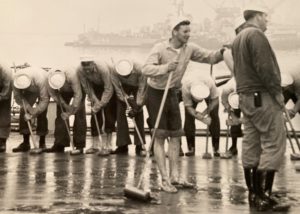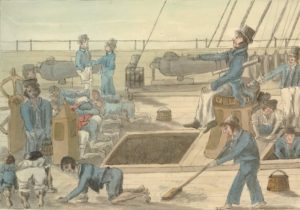My father, John F. Stith Sr., who was born in 1895 and quit school after the 7th grade, had a lot of opinions, like a lot of people. Only he wrote some of his down in a notebook he titled: “What I Would Do If I Were The Boss of Everything.”
The rule changes he suggested to improve boxing matches and basketball games were pretty radical. I’ll get to those bye and bye. He also commented on sex, which is where I’ll begin.
“Congenitally, every female has some attractions for the male of the species, to say nothing of what the male has to offer to the female,” my father wrote.

“So far as I know there is only one exception to this rule. The female fish lays her eggs and the male swims over them and fertilizes them. There is no physical contact between the male and female fish.”
“This probably gave rise to the expression, ‘the poor fish.'”
* * *
Here’s what he had to say about changing styles — Bermudas for ladies, then shorts, then short shorts, then hot pants — and what he called “a merchandising thought.”

“These [hot pants] were not accurately named as there was scarcely enough cloth used to keep a fly warm, much less hot. It seems that the people who dictate [and I do mean dictate] fashions for ladies bow down to the idea of less cloth, more woman.”
“I would rather my woman would keep at least something secret and out of public view. Then I could get the shivers from anticipating the full show for me and me alone.”
“A merchandising thought, ‘Don’t put all your merchandise in the show window.'”
Coming Monday: Speaking in Tongues

 pump wet the deck with seawater, and men with buckets cast sand over the planks. The watch then scoured away the previous day’s dirt and grime with soft white stones and stiff brushes. Some believe “holystoning” got its name because scrubbing sailors looked as if they were kneeling in prayer. This was the “most disagreeable duty in the ship,” wrote Samuel Leech, a sailor aboard during the War of 1812, especially “on cold, frosty mornings.”
pump wet the deck with seawater, and men with buckets cast sand over the planks. The watch then scoured away the previous day’s dirt and grime with soft white stones and stiff brushes. Some believe “holystoning” got its name because scrubbing sailors looked as if they were kneeling in prayer. This was the “most disagreeable duty in the ship,” wrote Samuel Leech, a sailor aboard during the War of 1812, especially “on cold, frosty mornings.”